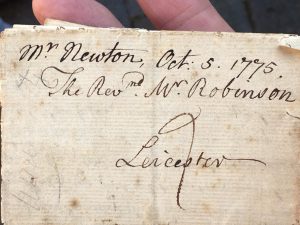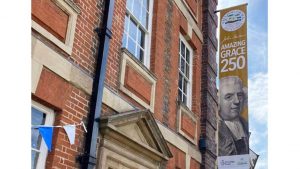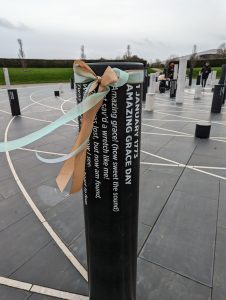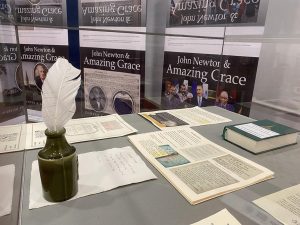Dr Lauren Alex O’Hagan from the Open University, presents ‘Amazing Grace’ in the Life and Work of Rory Gallagher in this video and article. Rory Gallagher was an Irish singer, songwriter and multi-instrumentalist. He pioneered the blues over three decades across the globe, performing 2000 concerts until his untimely death in 1995.
‘Amazing Grace’ in the Life and Work of Rory Gallagher
Dr Lauren Alex O’Hagan
Research Associate
The Open University
‘Grace’ is not a word that you often hear to describe a rock musician, yet ‘grace’ is the word that most frequently arises when talking about Rory Gallagher (1948-1995)—the Irish guitar virtuoso and accomplished singer-songwriter.
Rory Gallagher in 1975 |
While Gallagher was well known for his incendiary live performances, offstage, he was the antithesis of the prototypical rocker. He was shy, polite and humble, and shunned all the trappings of the decadent rock and roll lifestyle. He lived in a modest apartment with few possessions, never learnt to drive, never married or had children. He did not swear, nor did he take drugs or even smoke cigarettes, and called his mother every evening, no matter where he was in the world. In short, as ‘Godfather of Punk’, Terri Hooley, once put it, if you walked into a room full of people, Gallagher was the last person you would ever expect to be a “rock legend.”
Faith was also an important part of Gallagher’s life. Described by friend and band member Mark Feltham as “deeply religious,” Gallagher regularly attended mass, was an avid reader of books on Catholicism and was particularly fond of Seán Ó Riada’s mass settings. As a youngster, he had considered the priesthood, before ultimately finding his vocation with music. This was an image that he never quite shook, however, with Bob Geldof noting that Gallagher “could have been in a seminary” and describing him as a “priest with long hair.” “What mattered to Rory was not applause or travel or popularity, but that he was always in touch with God,” Canon Cashman made clear at his funeral in 1995.
Although Gallagher did not tend to speak publicly about his faith, many of his songs had a quasi-spiritual edge to them, from ‘There’s a Light’ to ‘Follow Me’. Towards the end of his life, he began to explore this further with songs on his 1990 album Fresh Evidence tapping into themes of “salvation, inspiration and just a hint of sadness.” In 1992, he recorded ‘Will the Circle Be Unbroken’ with The Dubliners—a popular Christian hymn about drawing strength following the death of a loved one. Around the same time, he also began to add the 18th-century hymn ‘Amazing Grace’ to his live set.
According to Gallagher’s brother and manager Dónal, Gallagher was likely attracted to ‘Amazing Grace’ because “the musically plaintiff song of repentance slides into the ‘gospel blues’ cannon” that he was always so fond of. Gallagher saw connections between the hymn and the blues, enabling him to draw upon both his religious and musical faith to offer his own unique interpretation of the song. Additionally, Dónal notes the fact that ‘Amazing Grace’ was penned by John Newton after being caught in a storm off the coast of Donegal—Gallagher’s birth county. This is something that his brother would have been well aware of and may have also influenced his decision.
Dónal also believes that the choice to perform ‘Amazing Grace’ was influenced by the “acute difficult health times” that Gallagher was going through at this stage of his life. The spiritual hymn, thus, took on a broader meaning for him as a “life-line link to healing.” While for John Newton, ‘Amazing Grace’ was about the greed of slavery, for Gallagher, it was about healing from the physical and mental health issues that plagued him, and he saw it as a “soothing ‘blues prayer’ for peace of mind.”
Gallagher always performed ‘Amazing Grace’ instrumentally, using his Takamine Dreadnought Style acoustic guitar and accompanied by Mark Feltham on harmonica which, in Dónal’s view, made the hymn “an ideal duet.” The 1994 Montreux Jazz Festival is where Gallagher played his most moving version of the song, joined also on stage by banjoist Béla Fleck.
Gallagher’s 1994 Montreux appearance is perhaps one of the strongest concerts of his career, yet was shrouded in difficulties for him. Going through a challenging battle with depression, he locked himself in his hotel room for four days after the concert and, just a few weeks later, experienced suicidal thoughts and considered jumping out of his hotel room window. Knowing this context gives the song an added poignance, the weeping sounds of Gallagher’s guitar expressing all that he struggled to convey with words.
Gallagher plays ‘Amazing Grace’ with such emotion and intensity, feeling every single note. This is improvisation at its best, the music growing organically as he begins with a blues-driven melody, before Fleck enters with his bluegrass tones. Together, they elegantly embark on a musical call and response, Gallagher now playing the familiar tune of ‘Amazing Grace’ with his glass slide and Fleck filling in the spaces between. The contrast between Gallagher’s sorrowful motif and Fleck’s upbeat accompaniment is beautiful, sonically embodying the meaning of ‘Amazing Grace’: that hope and faith will always get you through hard times. As Gallagher reaches the end of the hymn, he expertly segues into Robert Johnson’s ‘Walkin’ Blues’, followed by Bill Monroe’s ‘Blue Moon of Kentucky’. It is a powerful example of how a hymn can be lifted from its original context, brought into a new secular setting and acquire additional significance, transforming into a universal message of redemption.
Sadly, eleven months later, Gallagher passed away at just 47 years old. ‘Amazing Grace’ being “one of his favourites”—according to former band member Lou Martin—it was chosen for Gallagher’s funeral in Cork. The song was played by Martin on piano and Feltham on harmonica in the Church of the Descent of the Holy Spirit—a “tough” and “shattering” performance, especially as Feltham had played it so many times with Gallagher at his side. Three months later, a memorial service was held for Gallagher at Brompton Oratory in London (Gallagher’s local church). Ó Riada’s ‘Ag Criost an Siol’ was performed by a choir, while folk musician Martin Carthy wrote a eulogy centred around Gallagher’s grace:
One word, and one word only, can apply it seems to the person who makes life worthwhile by example, who loves his trade and the people who play it and one who tells them so. Who makes his peers feel good by his simple presence. Rory Gallagher graced music as he graced humanity. The word is Grace.
Yes, if ever there was a musician to personify the words of ‘Amazing Grace’—both in the way he lived his life and how he played his music—it was the brilliant, yet troubled, Rory Gallagher. Throughout his life, he faced many “dangers, toil and snares,” but it was grace that “brought [him] safe” and, ultimately, grace that “[led] him home.”
—–
My heartfelt thanks to Dónal Gallagher—as always—for very kindly sharing his own insights with me about the importance of ‘Amazing Grace’ to his brother.






